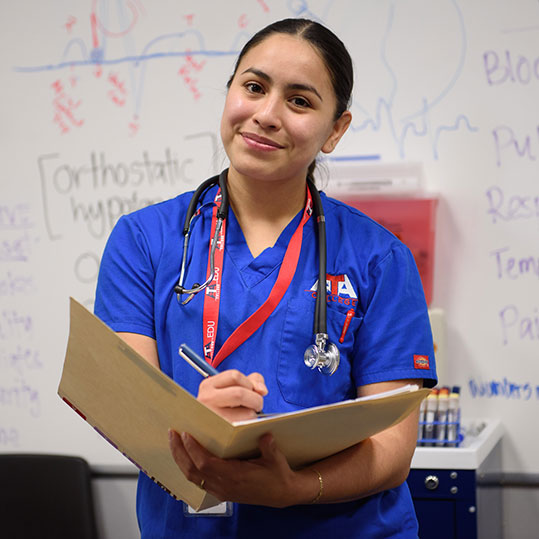Ready to get started in the medical field? Discover what it takes to become a certified medical assistant with this easy-to-follow guide.
Are you interested in becoming a certified medical assistant? Interested in a secure and rewarding career? The U.S. Bureau of Labor Statistics projects an 18-percent growth in medical assisting through 2030. However, healthcare is complex, and employers want trained applicants with proven skills to join their teams. One way to attract job offers is to become certified. The benefits are worth the effort.
What Does a Medical Assistant Do?
Medical assistants perform clerical and clinical tasks in healthcare settings including doctor’s offices, clinics, and hospitals. Under the supervision of a doctor, nurse, or administrator, they:
- Serve as a physician’s liaison, communicating with patients on his or her behalf.
- Triage patient inquiries about worrisome symptoms.
- Schedule appointments.
- Take vital signs.
- Measure height and weight.
- Collect urine, stool, and sputum samples for analysis.
- Draw blood.
- Perform diagnostic tests, such as EKGs, eye exams, pacemaker checks, and tuberculosis testing.
- Assist providers with exams, treatments, and procedures.
- Remove sutures and change light dressings.
- Sanitize equipment and sterilize instruments.
- Help patients with insurance forms.
- Collect health histories.
- Update medical records.
- Transmit prescriptions to pharmacies.
- Maintain medical equipment.
- Submit referrals to specialists.
- Manage medical records.
- Write correspondence and handle mail.
- Order health and office supplies.
- Stock exam rooms.
- Assist with billing and inventory management.
- Provide patient education.
It’s a satisfying career for students with diverse interests in medicine, science, and business.
How Do I Become a Certified Medical Assistant?
Graduating from an accredited medical assisting program and passing the certification exam is an easy way to become a certified medical assistant. There are alternative pathways for people educated in the military or with significant, supervised experience in the field. However, having a vocational school diploma and certificate is what most employers expect.
Training programs are intense but short. Full-time students graduate work-ready and prepared for certification in as little as nine months. With the most up-to-date training available and one of several certificates, new medical assistants are ready to compete for the best jobs.
What Certifications Are Offered to Medical Assistants?
Medical assistants are eligible for several certifications, one that is widely recognized is the Nationally Certified Medical Assistant (NCMA).
The National Center for Competency Testing (NCCT) is a reputable certifying agency that evaluates medical assistants. You need a vocational school diploma or two years of full-time experience to sit for the exam, but pass rates are significantly lower for applicants without a diploma.
NCCT’s exam includes 150 questions covering topics based on national employer surveys identifying the tasks medical assistants perform most in real-world settings. Subjects include:
- Anatomy and physiology.
- Pharmacology.
- Phlebotomy.
- Diagnostic testing.
- Laboratory procedures.
- Scheduling and resource management.
- Billing and insurance practices.
- Healthcare law including patient privacy.
- Workplace safety and risk management.
NCCT’s test asks 150 mostly multiple-choice questions. You’ll have up to three hours to finish the exam, and the results are immediate. Annual recertification requires continuing education, but the fee includes access to NCCT’s CE modules.
What Are the Benefits of Certification?
There are many benefits to becoming certified in medical assisting. Becoming certified:
Builds Self-Confidence
Transitioning from the classroom to the workplace is challenging enough without worrying about your abilities. Certification erases self-doubt, confirming that you have the full range of knowledge and skills that it takes to succeed as a medical assistant.
Demonstrates Proven Skills
Employers rely on their team members to be top performers, so job applicants without experience are at a disadvantage. New graduates have no way of proving their skills, but certification demonstrates their competency.
Makes You a More Versatile Employee
Healthcare is becoming more complex, so insurers are insisting that only qualified staff handle high-risk responsibilities. Medicare, for example, now requires that medical assistants be certified to enter doctors’ orders into medical records. Without certification, medical assistants are limited in what they can do.
Enhances Professional Growth and Development
Vocational school graduates are well-prepared for entry-level positions, but certification suggests they can handle greater responsibility without one-on-one supervision. Employers may consider certified applicants for jobs that diploma-only candidates won’t qualify for.
Getting a general certificate also lays the groundwork for specialty certifications. If you want to work in geriatrics, dermatology, oncology, or orthopedics, a certificate establishes your expertise and opens the door for professional development.
Shows Commitment
The healthcare field evolves continually, so keeping pace with new treatments and technological advances necessitates lifelong learning.
All certifying agencies require continuing education credits for recertification, so certified medical assistants are committed to staying abreast of developments in the field. It’s the type of dedication employers look for in their team members.
How Do Vocational Schools Prepare Students for Certification?
Vocational schools know that competency-based recruiting is the trend in most industries. Hiring is costly, so employers want guarantees that the applicants they bring aboard are qualified.
Getting a vocational school diploma is an important first step to a new career. However, certification is objective proof of your skills, so instructors do all they can to support you by teaching to the test. If you succeed, the school succeeds.
Programs cover all the material you’ll find on the exams, including:
- Anatomy, physiology, and pharmacology.
- Office procedures and computer applications.
- Billing and coding procedures.
- Medical ethics and law, including patient privacy regulations.
- Insurance and healthcare financing models.
- Laboratory and clinical protocols.
Vocational schools also help students help themselves by encouraging self-study and peer study groups.
What Happens If I Don’t Pass the Certification Exam?
The initial pass rate across all three certification exams averages 70 percent. If you don’t pass the first time, don’t worry. You can take it again. People fail exams for a broad range of reasons, the least of which is their competency. For most people, it’s test anxiety.
But your instructors have been there, so they’ll help you prepare, starting with these tips:
Start Studying Early
The best way to walk a mile is one step at a time. If you devote 30 minutes a week to test preparation, you’ll be confident on exam day.
Focus on What’s on the Test
There’s a lot to medical assisting, but exams only evaluate the core principles. You’ll find a test blueprint on each agency’s website. Review each subject, identify your knowledge deficits, and then focus on those areas.
Study With Peers
Students have different perspectives on what they learn, so your classmates may have insight on topics you struggle with. Getting together to study is both fun and helpful.
Take Practice Exams
All three certifying agencies offer practice tests for candidates. It’s an excellent way not only to review test material but also to evaluate the format. Most vocational schools offer review courses.
Test Early
Some medical assistants prefer to be experienced before sitting for certification. However, while it sounds prudent, the conventional wisdom is that the sooner you take the test the better. Test-taking is a skill, so why not take advantage of the practice you’ve had in school?
Request Accommodations
Test anxiety affects at least 50 percent of students. For some people, it’s devastating. Certification agencies want you to succeed, so if you have challenges, ask for special accommodations. Requests are confidential and many are approved.
Why Should You Become a Certified Medical Assistant?
Life is short. If your career doesn’t provide a sense of accomplishment, medical assisting offers that and more, including:
Job Security
Millions of Baby Boomers are on the verge of retirement, so the US needs a lot more medical assistants in the next decade to meet growing demand for preventive care. If you’ve always wanted a healthcare career, there’s never been a better time to secure your future in a thriving industry.
Excitement
Few things are worse than being bored at work. However, as a medical assistant you’ll be challenged. It’s a flexible role in which the full scope of your talents will be utilized and appreciated.
A Team Environment
Why be a small fish in a big pond when you can enjoy the support and camaraderie of other professionals? Medical assistants are an integral part of a goal-oriented team committed to quality care.
Personal Fulfillment
If finding meaning in your work is important to you, you’ll feel good being a medical assistant. In healthcare, everything you do matters, and the rewards last a lifetime. Few careers that you can train for in less than twelve months are that impactful.
A Positive Work-Life Balance
Burnout is problematic in many fields. Long days and on-call responsibilities eventually take a toll on life. However, medical assistants work regular daytime hours with weekends and holidays off. Not surprisingly, they report low levels of occupational stress.
Professional Respect
Backed by the NCCT, NCMA, medical assisting have a certification that is recognized nationwide.
Final Thoughts
Medical assisting is a dynamic field in which employers need a team with skills they can count on. In a competitive workplace, certification can be the difference between getting ahead and falling behind. Get all the necessary information on become a certified medical assistant, including requirements, qualifications, and certifications. Start your journey today!





